Does free speech protect COVID-19 vaccine misinformation?
Summary
The Supreme Court has held that many kinds of false statements are protected speech under the First Amendment. In a 2012 case called United States v. Alvarez, the Supreme Court struck down a law that made it a criminal offense to lie about having received military medals. It refused to hold that a statement’s falsity put it outside the realm of First Amendment protection.
But there are some kinds of false speech that can be penalized by the government, including lying in court, making false statements to the government, impersonating a government official, defaming someone and committing commercial fraud. But it’s a pretty limited list. The Supreme Court’s general finding is that false statements can often be valuable in terms of allowing people to challenge widely held beliefs without fear of repercussions, and that things could go pretty wrong if the government had a wider berth to regulate them.
Read More
